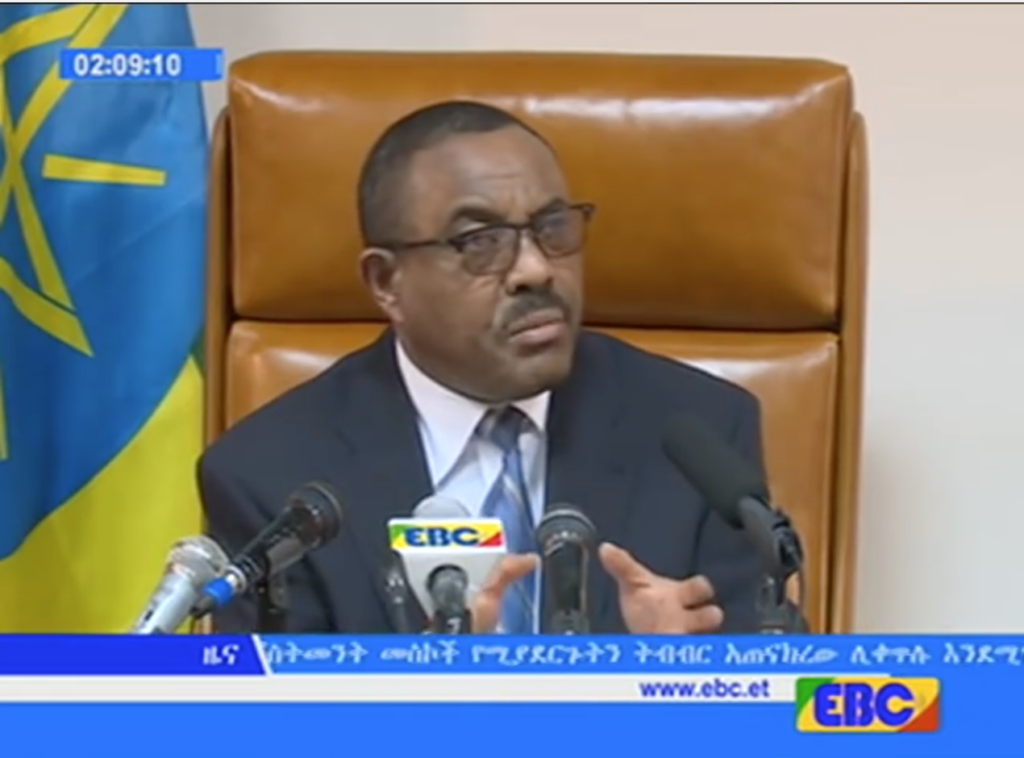The Council of Ministers of the Federal Democratic Republic of Ethiopia has declared a six-month state of emergency effective from Saturday, 8 October 2016, to reverse the danger posed by destabilizing forces undermining the safety of the people and security and stability of the country.
The decree came following detailed discussion by the Council of Ministers on the situation that led to the loss of lives and damage on properties.
The Ethiopian constitution under article 93 provides the power for the Council of Ministers to decree a state of emergency “should an external invasion, a breakdown of law and order which endangers the constitutional order and which cannot be controlled by the regular law enforcement agencies and personnel, a natural disaster, or an epidemic occur.”
The decree has been submitted to the Ethiopian Parliament according to the constitution.
Context
Prime Minister Hailemariam Desalegn said the state of emergency is crucial in halting the danger posed by the spoilers and anti-peace groups on the safety of the people as well as peace and stability of the country.
“The state of emergency is vital. It is essential to restore peace and stability over a short period of time,” the Prime Minister said.
Hailemariam said “The state of emergency will not breach basic human rights enshrined under the Ethiopian constitution and won’t also affect diplomatic rights listed under the Vienna Convention”.
Orchestrated violent activities carried out in various parts of the country led to the loss of lives and enormous damage on properties in the last weeks.
The country over the past decade has witnessed a double digit economic growth, huge infrastructure development, accumulation of wealth and growing FDI inflow because peace and stability prevailed in the country.
The Prime Minister said these infrastructures that consume huge investments are being destroyed by these anti-peace elements within a short period of time.
In the last weeks, investments amounting to several million euros were destroyed by protesters.
Schools, health institutions, administrative institutions are also being attacked.
The violence in some parts even goes beyond damaging properties, the Prime Minister said, adding, the forces are trying to trigger conflict among different ethnic groups and followers of different religions.
If not properly addressed within a short period, the situation could undermine the national integrity of the country.
Precisions by the Federal Attorney
The Office of the Federal Attorney disclosed measures that will be taken during the state of emergency to restore order, ensure safety of the public and stability of the state.
The nature of recent violent demonstrations and conflicts that led to the loss of lives and destruction of properties make the state of emergency crucial, as it is difficult to handle this situation using regular law enforcement, General Attorney Getachew Ambaye said.
The country is not placed under curfew currently, even though the law allows the introduction of a curfew during the emergency rule, Getachew further specified.
Provision of the Constitution of the Federal Democratic Republic of Ethiopia about the State of Emergency (Excerpts)
Article 93.1.
(a)The Council of Ministers of the Federal Government shall have the power to decree a state of emergency should an external invasion, a breakdown of law and order which endangers the constitutional order and which cannot be controlled by the regular law enforcement agencies and personnel, a natural disaster, or an epidemic occur.
Article 93.4
(a) When a state of emergency is declared, the Council of Ministers shall, in accordance with regulations it issues, have all necessary power to protect the country’s peace and sovereignty, and to maintain public security, law and order.
(b) The Council of Ministers shall have the power to suspend such political and democratic rights contained in this Constitution to the extent necessary to avert the conditions that required the declaration of a state of emergency.
(c) In the exercise of its emergency powers the Council of Ministers cannot, however, suspend or limit the rights provided for in Articles 1, 18, 25. and sub- Articles 1 and 2 of Article 39 of this Constitution.
Read the full Ethiopian Constitution
Contact : info@ethiopianembassy.be // +32 2 771 32 94




